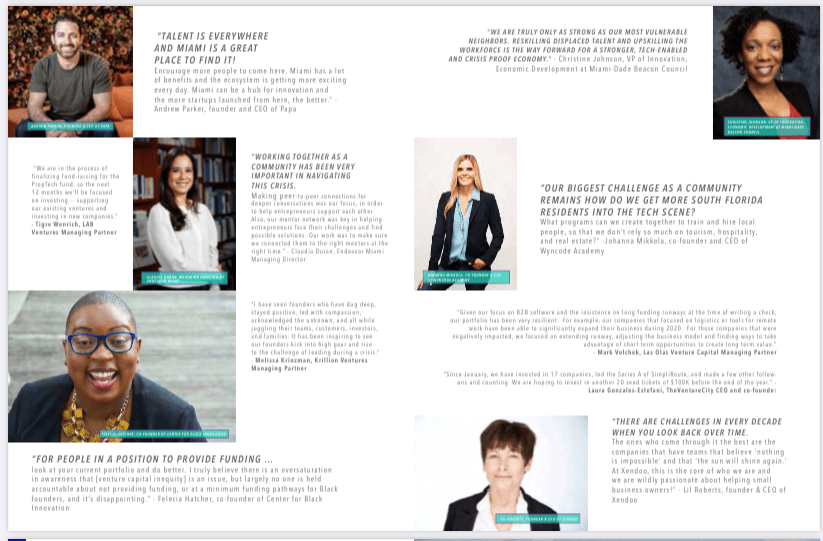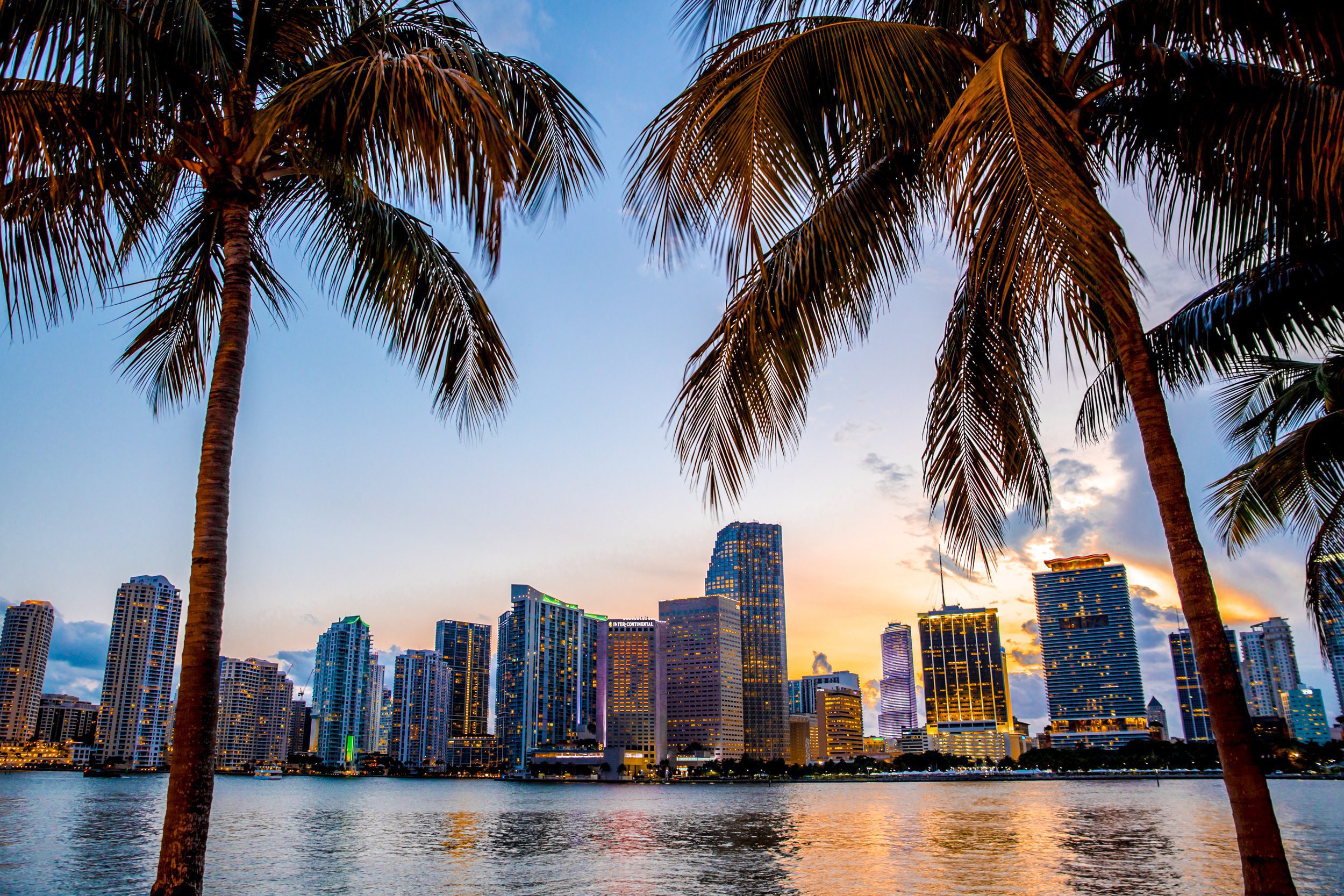 Host’s note: I usually write a year-end note, but I think this one that I wrote in October for a special eMerge Americas Insights report sums up my thoughts on the year pretty well, and for the column I also reached out to a dozen or so ecosystem community leaders, founders and investors to get their perspectives. It’s been updated slightly but does not reflect this month’s extraordinary influx sparked by Mayor Suarez’s tweet. Still, I hope you find it reflective of the year that we all experienced.
Host’s note: I usually write a year-end note, but I think this one that I wrote in October for a special eMerge Americas Insights report sums up my thoughts on the year pretty well, and for the column I also reached out to a dozen or so ecosystem community leaders, founders and investors to get their perspectives. It’s been updated slightly but does not reflect this month’s extraordinary influx sparked by Mayor Suarez’s tweet. Still, I hope you find it reflective of the year that we all experienced.
***
What a year it has been. The COVID-19 health crisis and the crushing recession it unleashed has been devastating to our community. If there is any silver lining in all this, it is that the tech sector and South Florida’s tech startups have shown amazing resilience as a whole, and the tech and startup community mobilized quickly to launch programs and fund resources to support one another and the region at large.
There’s long been a need for a more diversified South Florida economy – not one so reliant on hospitality/tourism and real estate. COVID made the case loud in clear that tech needs to be a larger economic driver – and be there for the whole community. The Black Lives Matter movement of 2020 spurred the tech community to look inward at our inclusivity, and what we’ve seen is there is work to do.
“The events of 2020 have proved to be an inflection point — one that shined a harsh but veritable light on the disparities in access to opportunities and resources for groups of entrepreneurs in Miami,” said Leigh-Ann Buchanan, VentureCafe Miami’s Executive Director.
The Miami-Dade Beacon Council’s Technology Committee rolled out
MiamiTech.Works, a one-stop-shop portal with local information aimed at connecting those recently laid off or underemployed with local reskilling opportunities in tech, such as short courses by local coding schools, personalized career development coaching and one-on-one access to hiring managers of companies currently looking for workers.
The Knight Foundation funded a number of initiatives, such as Black Angels Miami focused on getting more black and brown professionals involved in startup investing, as well Black Girl Ventures and Culture Shift Labs. In the early days of the pandemic, Knight and Krillion Ventures also formed a successful pop-up program, SWOT305, to provide free 1-on-1 coaching, cohort-based classes and forums with investors about how entrepreneurs could make the best decisions with the resources they have to weather the storm, said Raul Moas, Knight’s Miami Program Director.
Knight also funded a scholarship program for Wyncode Academy’s coding bootcamps, and other organizations stepped up with more grant programs, scholarships, additional office hours, informational webinars and resources. “It has been remarkable how people have helped other people in need. Information was almost real-time available for people and businesses,” said Laura Gonzalez-Estefani, founder and CEO of TheVentureCity. “We have learned that together we are stronger.”
Update: In November, Knight also announced it funded the new Center for Black Innovation, along with NBCUniversal and the Surdna Foundation, with a $2.1 million investment. The Center, led by Felecia Hatcher and Derick Pearson, will serve as a national thinktank for Black innovation, providing research, tech training for students, educational programs for founders and an expansion of its VC-in-residence program.
The work continues on all fronts, but we have positive momentum in the ecosystem to report:
- In October, Private equity giant Blackstone announced it would be setting up a large office in Miami, bringing as many as 215 tech-focused jobs paying average annual salaries of $200,000. This follows last year’s news of SoftBank Group significantly growing its presence in the Magic City, and Kaseya and OfferUp increasing hiring.
- In the Inc. 5000 list of fastest growing companies, South Florida was well represented with 157 companies making the list, up from 149 companies in 2019 and 125 in 2016. Arteza, the art supplies e-commerce startup, ranked at the top in South Florida for 3-year growth of 7,551 percent. Other tech and startup companies in the top 100 include ZeroBounce, Ecosystems, TaxFyle and Springbig.
- And despite it all, venture capital flows slowed but did not shut down, following the South Florida’s record-setting 2019. In the first half of the year, the Miami metro ranked 11th in the country. Major fundings so far in the second half include a $50 million equity investment into telehealth pioneer MDLIVE, now valued as a unicorn, and a $72 million raise for Neocis, a Miami healthcare-robotics company. (Update: Since this writing, Reef Technology has raised $700 million and ShipMonk closed a $290 million raise, so suffice it to say, the Miami metro area will likely exceed or at least close in on the record of 2019.)
So far in 2020, Miami Angels, South Florida’s largest angel network with more than 100 members, invested over $2.3 million in nine new Florida-based deals and made five follow-on investments. The group has also seen more engagement with higher meeting attendance because of the convenience of Zoom.
“Back in March, we were planning for the worst. What we’ve found to be the case, however, has been the complete opposite – we are on track to have a record investment year in both dollars invested and number of deals,” said Rebecca Danta, Miami Angels Executive Director.
What’s more, Miami-based TheVentureCity, which funds 68 startups (Update: now 75!) globally, reports that many of its startups raised or are currently raising in the middle of a pandemic. LAB Ventures has resume fund-raising for its new $50 million fund for proptech, one of Miami’s growing startup sectors.
While in-person conferences, networking and pitching events were shut down by COVID, including eMerge Americas signature conference, eMerge, Venture Café, Endeavor Miami and many other community organizations didn’t miss a beat by holding investor talks, showcases and pitching events virtually. As might be expected, some startups were able to seize opportunity during the pandemic, particularly in areas like telehealth, remote work and schooling, logistics and e-commerce.
Papa, which connects the elderly with “Papa Pals” for help with life’s everyday challenges, raised $18 million in venture capital, despite the pandemic. “The loneliness epidemic has only been exasperated by the pandemic. We launched virtual visits in an effort to provide assistance from a distance during this time,” said Andrew Parker, Papa’s founder and CEO.
Edtech startup Caribu grew 10X literally overnight, said CEO and co-founder Maxeme Tuchman. “For families during the pandemic, their #1 priority was to stay safe, but their #2 priority has been to stay sane. Caribu, fortunately, fits squarely in that second priority and I am truly grateful that we’ve been able to help kids and their families stay connected in a more fun, engaging, and educational way during this very difficult time.”‘
Similarily, Arteza has seen major increases in demand and new customers. “The levels we are experiencing are significantly greater than pre-pandemic, nearly catapulting us a year beyond our proposed roadmap,” said Brenda Freeman, who was named CEO of Arteza this year. “We’ve also expanded as a company, nearly doubling our staff and continuing to hire ambitiously.”
Several other South Florida tech companies have new CEOs this year. Magic Leap’s board selected Peggy Johnson, a Microsoft executive with more than 30 years of experience bringing tech enterprise solutions to market. Plum and Nymbus also have new CEOs, all industry veterans.
The Miami tech community is in a position to benefit from the remote work surge, as more people in tech can work from anywhere, Moas says (Update: He’s right!). The need for a strong, inclusive tech hub is great because 2020 has “elevated, once again, our region’s dependence on highly susceptible and vulnerable sectors in the economy, tourism and hospitality in particular,” he said. “The folks in Miami who are the least prepared to take a hit are the ones taking the biggest hit.”
Adds Brian Brackeen of Lightship Capital: “Miami continues to rise. Our resilience is born on our mix of immigrant grit, American ingenuity, and Miami hustle. That said, we need to bring more capital and training programs to Miami. The need is so great. Thousands of people a month move to South Florida, and efforts that were successful in the past must be done again. We have to keep pulling each other up, and investing in each other. The job is not done yet.”
And Felecia Hatcher, founder of the Center for Black Innovation, has the last word: “I think we in some ways stopped focusing on are we building the next unicorn here in South Florida and started asking is the collective ok? We need community more than ever, and we should never stop trying to build it. The year has also taught us that we must widen the scope of what community means, and use what we can in moments of crisis to gather and support each other.”
***
Download the eMerge Americas report here. It also includes a rundown on the first half of the year for South Florida and Florida venture capital and where our metro area ranked nationally. Stay tuned for the full year eMerge Insights report in early spring.
I also provided a quote board with the column and eMerge Americas did a super nice job with it. See below.

Happy New Year, dear readers. I am looking forward to turning the page on 2020 and excited for what’s ahead.
Follow @ndahlberg and email me at [email protected].
- 8+ things to know in #MiamiTech: Dapta and Siprocal raise funding, plus news from Jeff Bezos, MoonPay, Sustainable Skylines, Freebee & more - April 11, 2024
- Slow start for Q1 South Florida VC but deal count showed strength. Here are the top deals. - April 11, 2024
- Bucking the trends, Miami Angels posted a record 2023, a strong start in ’24, and more - April 10, 2024





